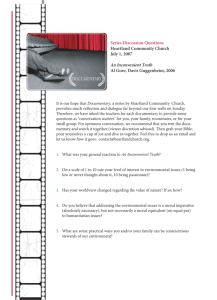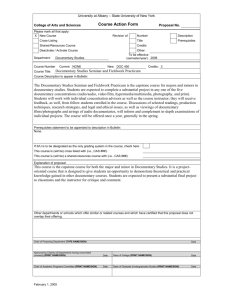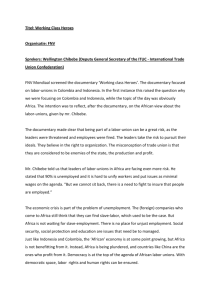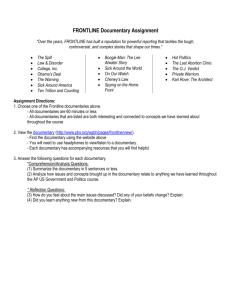Hacker, Diana and Nancy Sommers. A Pocket Style Manual. 6th ed
advertisement
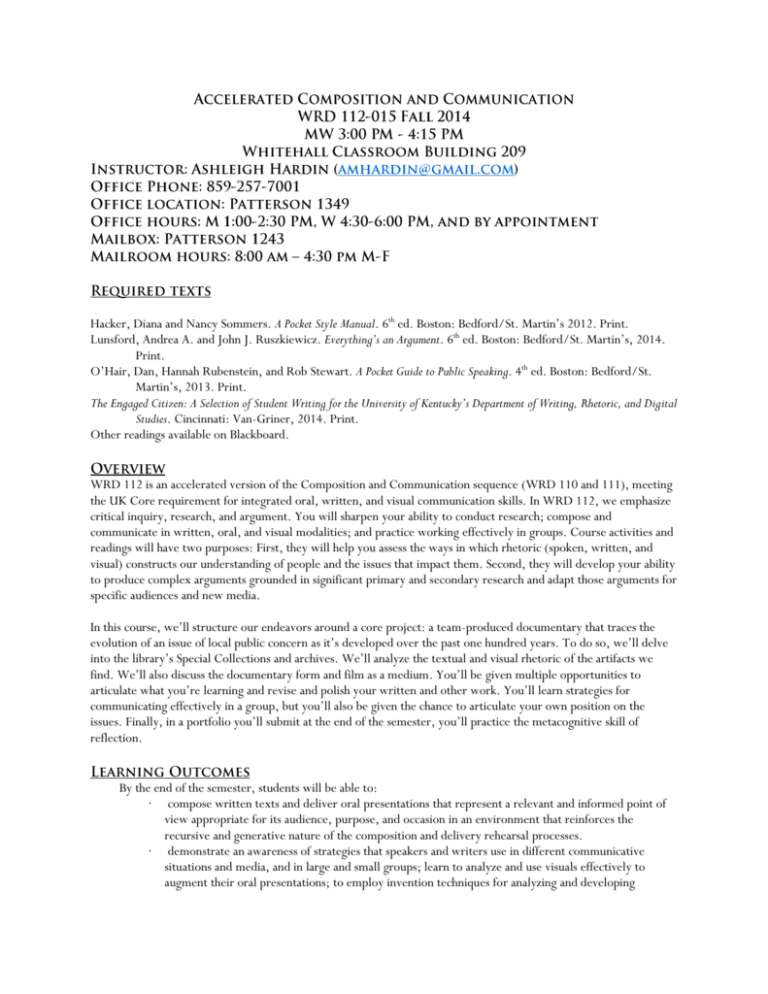
Hacker, Diana and Nancy Sommers. A Pocket Style Manual. 6th ed. Boston: Bedford/St. Martin’s 2012. Print. Lunsford, Andrea A. and John J. Ruszkiewicz. Everything’s an Argument. 6th ed. Boston: Bedford/St. Martin’s, 2014. Print. O’Hair, Dan, Hannah Rubenstein, and Rob Stewart. A Pocket Guide to Public Speaking. 4th ed. Boston: Bedford/St. Martin’s, 2013. Print. The Engaged Citizen: A Selection of Student Writing for the University of Kentucky’s Department of Writing, Rhetoric, and Digital Studies. Cincinnati: Van-Griner, 2014. Print. Other readings available on Blackboard. WRD 112 is an accelerated version of the Composition and Communication sequence (WRD 110 and 111), meeting the UK Core requirement for integrated oral, written, and visual communication skills. In WRD 112, we emphasize critical inquiry, research, and argument. You will sharpen your ability to conduct research; compose and communicate in written, oral, and visual modalities; and practice working effectively in groups. Course activities and readings will have two purposes: First, they will help you assess the ways in which rhetoric (spoken, written, and visual) constructs our understanding of people and the issues that impact them. Second, they will develop your ability to produce complex arguments grounded in significant primary and secondary research and adapt those arguments for specific audiences and new media. In this course, we’ll structure our endeavors around a core project: a team-produced documentary that traces the evolution of an issue of local public concern as it’s developed over the past one hundred years. To do so, we’ll delve into the library’s Special Collections and archives. We’ll analyze the textual and visual rhetoric of the artifacts we find. We’ll also discuss the documentary form and film as a medium. You’ll be given multiple opportunities to articulate what you’re learning and revise and polish your written and other work. You’ll learn strategies for communicating effectively in a group, but you’ll also be given the chance to articulate your own position on the issues. Finally, in a portfolio you’ll submit at the end of the semester, you’ll practice the metacognitive skill of reflection. By the end of the semester, students will be able to: · compose written texts and deliver oral presentations that represent a relevant and informed point of view appropriate for its audience, purpose, and occasion in an environment that reinforces the recursive and generative nature of the composition and delivery rehearsal processes. · demonstrate an awareness of strategies that speakers and writers use in different communicative situations and media, and in large and small groups; learn to analyze and use visuals effectively to augment their oral presentations; to employ invention techniques for analyzing and developing · · · · arguments; to recognize and address differing genre and discourse conventions; and to document their sources appropriately. find, analyze, evaluate, and properly cite pertinent primary and secondary sources, using relevant discovery tools, as part of the process of speech preparation and writing process. develop flexible and effective strategies for organizing, revising, editing, proofreading, and practicing/rehearsing to improve the development of their ideas and the appropriateness of their expression. collaborate with peers, the instructor, and librarians to define revision strategies for their essays and speeches, to set goals for improving them, and to devise effective plans for achieving those goals. engage in a range of small group activities that allow them to explore and express their experiences and perspectives on issues under discussion. All of our work in this course will build toward your core project, a team-produced documentary film about the evolution of an issue of local public concern. Some of the assignments we complete will produce material that you can use in that core project, and others will provide you with the skills and competencies necessary to tackle the project. If you have any questions about how an assignment is related to our core project, please let me know. Assignment 1: Front page analysis (due F 9/19): 5% of final grade Using the library’s New York Historical database, you’ll find the front page of the New York Times from the day you were born. In a short essay (500 words), you’ll analyze the visual and rhetorical choices of the writers and editors. What does this page tell you about what was important to people then? How might the page be constructed differently today? Assignment 2: Out of the archives presentation (scheduled M 10/6 and W 10/8): 15% of final grade For this assignment, we’ll take a trip to the library’s Special Collections and look through an archive prepared for us by librarians. You’ll choose an artifact that you want to examine closely and learn more about. You’ll research this artifact, with the help of librarians, your classmates, and me. Then, you create a presentation 4-6 minutes in duration that introduces the artifact to the class. You’ll use at least three visuals (one of which may be the artifact itself) to tell the class about the artifact’s history, significance, and what about it interested you. You’ll conclude the presentation by discussing the issues of public concern that the artifact might speak to. Assignment 3: Mini-video (due 10/24): 5% of final grade Understanding the formal elements of film will be important to a successful documentary. In this assignment, you’ll be given a film term or technique (e.g. dissolve, close-up, tracking shot, nondiegetic sound) that you must define and provide examples of in a short, informative video (2-3 minutes). Your video should include your voice, explaining the term, as well as examples, either produced by you or drawn from other films. You’ll conclude the video by discussing what use this technique or term might be put to in your documentary (or the documentaries of your peers). The video will then be shared with the class so that we can, by watching them, learn more about film technique. Assignment 4: Rhetorical analysis of documentary (due 11/7): 15% of final grade To prepare for your core project, you’ll view a documentary related to the topic your group has chosen for your core project. Each member of the group should choose a different documentary to view, and the film should be professionally produced and at least 30 minutes in length. In an essay of at least 1500 words, you’ll analyze the structure and rhetoric of the documentary. What is the rhetorical position of the documentary and what formal elements (i.e. choices of cinematography, editing, and sound) illustrate this? How is the documentary structured? Who is the audience for the documentary? What are its intentions and what are its effects? The purpose of this assignment is not to take a position on the documentary or on the issue, but to study in depth how another filmmaker made the choices he/she made. I’ll gladly make film recommendations and help you track down documentaries you want to watch. Core project: Team-produced documentary (due M 12/8): 30% of final grade total This is our big assignment for the semester. You’ll choose a topic shortly after your “out of the archives” presentation. You’ll be grouped with classmates who are interested in the same topic and who want to work with you. The rest of the semester, you’ll work together to outline, script, shoot, edit, re-outline, rescript, reshoot, and re-edit a documentary of 7-10 minutes. The documentary will trace the evolution of a local issue of public concern over the last 100 years. 20% of your grade will be for the documentary itself. You’ll be graded on whether the documentary meets minimum requirements for form, audience, and content. No one expects you to become the next Martin Scorsese in this class (though I won’t be the one to hold you back from trying), but your documentary should show evidence of preparation, forethought, and careful editing. 3% of your grade will be for a storyboard your group will create and submit F 11/14. The storyboard should contain at least 500 words of text that you’re planning to include as script: voiceover narration, interview questions, etc. 5% of your grade will be for the rough cut of the documentary you’ll turn in M 11/24, before the final cut is due. 2% of your grade will be for a group assessment. After the documentary is complete, you’ll write up a brief assessment (200 words per person) of each group member’s (including your own) contribution to the project. This assignment is intended to get you to reflect on your collaboration, not to punish slackers or reward those who did more than their share. If you have a problem with a group member, please let me know before the final documentary is due. Portfolio and position reflection (due M 12/15): 10% of final grade At the end of the semester, you’ll create a portfolio that can serve as an example of the work you’ve produced this semester. The purpose of the portfolio is not to showcase only your best work or to throw everything you’ve done all semester in a folder. Instead, you’ll create a digital space (using Google Sites) where you can upload the pieces that tell the story you want to tell. Part of this story should include how your position on the issue has evolved. Your portfolio will contain no fewer than three pieces you created for class. These pieces will constitute 3% of your grade. The other 7% will derive from a position reflection essay of 1000 words in which you discuss the pieces in the portfolio and how your position on the issue has evolved over the course of the semester. It should conclude with ideas for how and where you might continue to research and write about your topic. In-class activities/homework: 10% of final grade Writing is a bit like exercise: we need to practice it every day to stay in shape. I’ll assign short homework assignments from time to time and collect and comment on in-class work. I don’t like to give reading quizzes, but will if I have to. Participation: 10% of final grade Active participation in this course requires more than regular attendance. High participation grades will be awarded to students who consistently demonstrate engagement with the class, volunteer to speak or share writing/ideas, and maintain a positive, respectful, and enthusiastic attitude. Needless to say, tardiness, unexcused absences, lack of preparation (not having your book or other materials, failing to complete reading), and disrespectful and negative attitudes will be given low participation grades. However, being a passive observer of the class without engaging in the aforementioned disruptive behaviors will constitute a middle grade in participation (i.e. a C), not a high grade. If for any reason you are averse to speaking up in class, please come talk to me about how your active participation in class can be shown. Students must complete all Assignments, the Core Project, and the Portfolio to receive a passing grade in the course. Grading scale: 90-100% = A 80-89% = B 70-79% = C 60-69% = D 59% and below = E Attendance – University Senate Rules state that students who miss 20% of class contact hours, regardless of whether those absences are excused or unexcused, cannot pass the course. For a course meeting two times a week, 20% is six classes. Students who accumulate two unexcused absences in this course will have their participation grade reduced by one-third (3% of the final course grade) for each subsequent unexcused absence. Five unexcused absences will constitute a zero in participation, regardless of the level of participation you demonstrate when in class. Please see University Senate Rules http://www.uky.edu/StudentAffairs/Code/part2.html for an explanation of excused absences. Tardies of less than 10 minutes will constitute absences at the rate of three tardies for one absence. Leaving class early will be treated as a tardy. Tardies of more than 10 minutes will be treated as unexcused absences. However, if you have a university-approved reason for tardiness, you can be excused with documentation. Late Work – Essays and many other assignments are submitted via Blackboard. For this reason, absence from class should not prevent you from submitting these assignments in a timely manner. However, you may be granted an extension on an assignment if 1) you contact me before the due date and 2) you can prove circumstances that would normally be grounds for an excused absence (see University Senate Rules). If you have not been granted an extension, assignments will lose one letter grade for each 24 period they are late. After four days, you will receive a zero for the late assignment. As for presentations, you should plan on being prepared to present on the first day listed on the schedule. We will use a sign-up sheet to determine the order of presentations. If you are unprepared or absent when it is your turn to present, your presentation will not be accepted late unless you have a documented illness or emergency. Universitysponsored events and religious holidays, because you are aware of them in advance, are not reasons to complete a presentation late. Be aware of your schedule and let me know at least two weeks in advance if you are going to have this kind of excused absence on a presentation day. In-class work cannot be submitted late under any circumstances, but may be exempted with an excused absence. Peer Groups – Because most writers, educators, and other professionals must learn to work collaboratively, you will work with peers both in and out of class. Treat everyone in this class as a valued colleague, and you will have few problems. Keep correspondence professional and polite, and abide by all deadlines set by your classmates as though they were set by me. Consequences for “slacking” may result in anything ranging from a full letter grade deduction for the assignment to a zero or being removed from a group. Academic Integrity – As an instructor at the University, I am ethically obligated to report all instances of plagiarism to the proper authorities. The University of Kentucky defines plagiarism as: “When students submit work purporting to be their own, but which in any way borrows ideas, organization, wording or anything else from another source without appropriate acknowledgment of the fact” (USR 6.3.1). This includes internet sources, published articles or books, the work of a tutor, parent, or other student, and/or work you have previously submitted for a grade in another class. The minimum penalty for plagiarism is a zero on the assignment. Depending on the seriousness of the offense, students may receive an E if they are found to have committed plagiarism. WRD 112 will provide instruction in documenting sources and avoiding plagiarism. If you have a question regarding source usage, you are encouraged to talk to me before the assignment is due. Students found guilty of committing plagiarism are subject to the penalties outlined in the University Senate Rules. Senate Rules (6.3.1 & 6.3.2) can be found at the following website: http://www.uky.edu/USC/New/rules_regulations/index.htm. Blackboard – The majority of work for this course will be submitted via Blackboard. You are expected to check Blackboard regularly, to download and print required materials from Blackboard, and to report technological problems to UK IT promptly (helpdesk@uky.edu). I cannot be responsible for resolving technological difficulties and will require documentation of contact with UK IT from any student requesting additional time or special accommodations because of Blackboard difficulties. Office Hours – You are encouraged to visit office hours or to email me to make an appointment if you are unavailable during that time. I am here for you during office hours, and I really enjoy meeting with students and talking to them about their work. Office hours can be used to discuss any aspect of the class, and are especially appropriate if you wish to discuss a grade or receive additional help with a draft or assignment. To protect your privacy, I do not discuss grades, attendance, or individual student performance outside of my office, so please do not approach me before or after class to discuss these kinds of issues. Email Correspondence – I will not discuss grades via email or read/provide additional comments on drafts unless you visit office hours – email is not an ideal medium for tutoring, teaching, or discussing private matters like grades. Any student who wants additional help with an assignment is welcome to visit office hours or make an appointment. If you email me a paper or other assignment and ask me to look it over, I will ask you to make an appointment to meet with me. However, email is appropriate to let me know if you are having technical difficulties, need to make an appointment, or will need to miss class. Please allow 24 hours for me to respond; if you do not hear back from me after 24 hours have passed, don’t hesitate to email me again and gently remind me about your previous email. I’ve many times found student emails in my spam folder. (You should check your spam folder from time to time as well, in case that’s where my emails end up.) The Robert E. Hemenway Writing Center – The Writing Center offers help to students at all stages of the writing process. Located in the basement of Young Library, B-108B, the tutors there can provide assistance with written, spoken, and multimodal projects. It’s a free service for students, and I enthusiastically recommend their services. To learn more, visit their website: https://wrd.as.uky.edu/writing-center. Accommodations for Disabilities – I want my classroom to be accessible for all students. If you are registered with the Disability Resource Center (DRC) and require special accommodations to complete the work for this course, please provide me with a letter from the DRC that details what you need before you need the accommodations. Contact the DRC at 257-2754 if you have questions about your eligibility for special accommodations. Let me know if you have any other concerns about accessibility. I’m happy to work with you. Classroom courtesy and decorum – Our classroom environment should be one of mutual respect. For this reason, I expect everyone to demonstrate courtesy towards others and their views. Spirited debate in class is encouraged; intolerance, name-calling, and discrimination are prohibited. These kinds of overt disrespect are usually not problems in the classroom, but if they are, I reserve the right to ask students who engage in these behaviors to leave the classroom. Please see the Code of Student Conduct for more information. http://www.uky.edu/StudentAffairs/Code/part1.html I encourage students who feel they are being disrespected or distracted by their classmates to let me know. You are a valued member of our intellectual community, and I will do everything in my power to maintain the integrity of our classroom environment. Subtler forms of discourteous behavior, such as repeatedly leaving the classroom, gratuitous texting/talking, doing other work, or watching non-class related videos on your laptop, etc., should be avoided as well. If you demonstrate disrespectful, distracting, or discourteous behavior, I will give you an initial warning via email. If you are found to be distracting your classmates after the initial warning, I will not further disturb the class by calling attention to it. I will just quietly dock your participation grade as I would for one unexcused absence each time I see it. TL;DR – I don’t care if you check your phone or send the occasional text. If you make me start caring, you are being disruptive. Don’t. M 9/1 – Academic holiday: Labor Day W 9/17 – Last day to drop a class F 9/19 – Assignment #1 due via Blackboard M-W 10/6-8 – Assignment #2 due in class M 10/20 – Midterm of fall semester (Note: we don’t have a midterm exam, but you’ll receive a grade for the course so far at midterm) F 10/24 – Assignment #3 due via Blackboard F 11/7 – Last day to withdraw from a class F 11/7 – Assignment #4 due via Blackboard M 11/24 – First cut of documentary due W-F 11/26-29 – Academic holidays: Thanksgiving M 12/8 – Final cut of documentary due M 12/15 – Final portfolio and position reflection due via Blackboard
